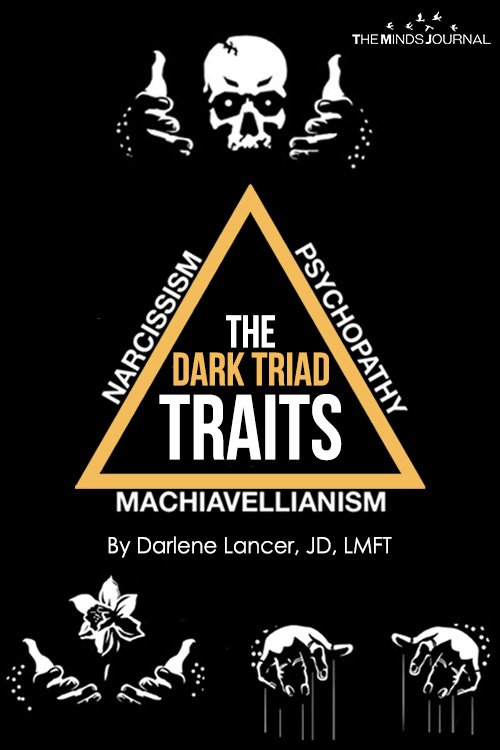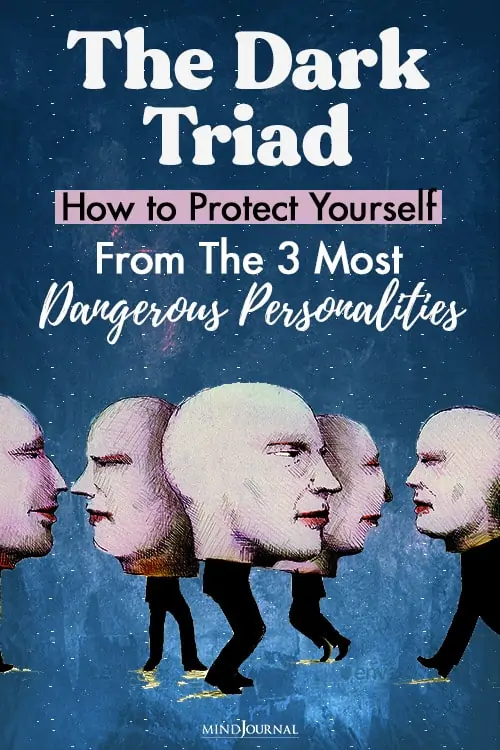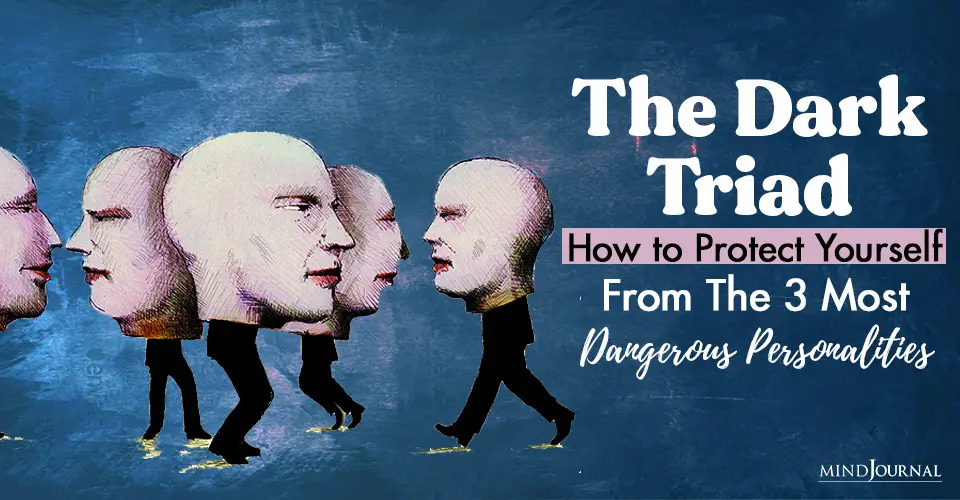Think of the Dark Triad of Narcissism, Psychopathy, and Machiavellianism as the Bermuda Triangle – it’s perilous to get near it!
The traits of all three often overlap and create personal profiles that are damaging and toxic, especially when it comes to intimate relationships, where we let our guard down.
One woman was the subject of identity fraud. Her bank accounts and credit cards were compromised. At the time, she was in love with her boyfriend who lived with her in her apartment. She was speaking regularly with the FBI and suffered extreme anxiety and emotional stress. The authorities were unsuccessful in finding the culprit. Her fiancé was very supportive in doing research to try to find him.
He comforted her, occasionally bought her gifts, and paid her monthly rent out of money she gave him. When the landlord confronted her about months of delinquency, she realized that the criminal was, in fact, her own boyfriend, who had been pocketing her rent money, except to buy her gifts. Her denial made it difficult to accept the truth about his ruthless gaslighting.
Read : 6 Feelings That Sociopaths and Narcissists Leave Behind
What is the Dark Triad
This is a popular term was coined in 2002 by Paulhus and Williams. Dark Triad refers to three unusually negative personality traits—narcissism, psychopathy, and Machiavellianism. The latter two share more traits with each other than with narcissists. Generally, the term refers to individuals with “subclinical” symptoms, meaning that they may not necessarily fully have narcissistic personality disorder (NPD) or anti-social personality disorder (ASPD). Machiavellianism arose out of Machiavelli’s philosophy and is not a mental health disorder.
• Narcissism is characterized by the pursuit of ego gratification, vanity, and a sense of superiority, grandiosity, dominance, and entitlement.
• Machiavellianism is marked by manipulation – a calculating, duplicitous and amoral personality, focused on self-interest and personal gain.
• Psychopathy is distinguished by callousness, impulsivity, and enduring antisocial and bold behavior.
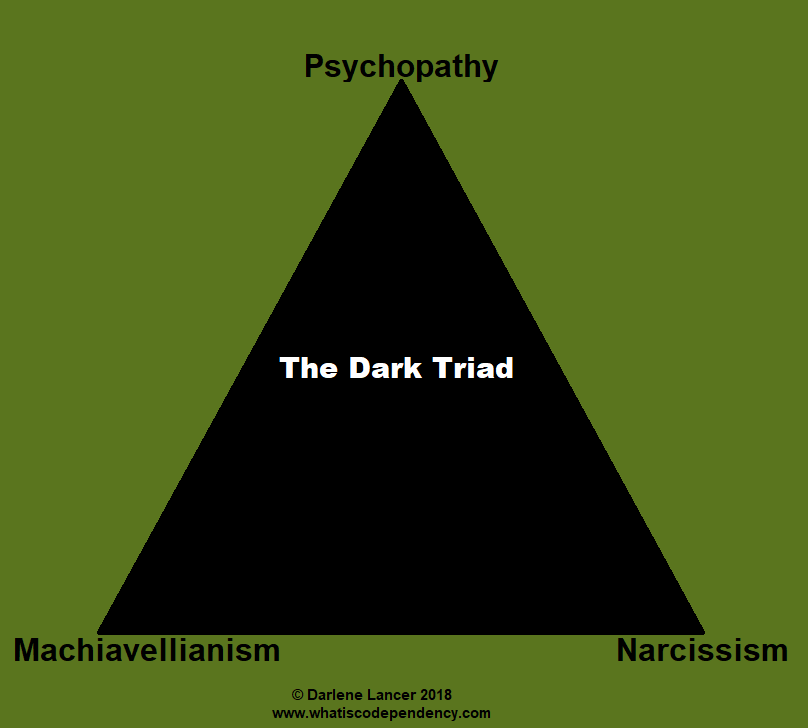
Common Dark Triad Traits
Recent comparative research on the Dark Triad has attempted to analyze differences among these three malevolent personalities. To varying degrees, all act aggressively out of self-interest and lack empathy and remorse. They’re skilled at manipulation and exploit and deceive others, though their motivations and tactics vary. They violate social norms and moral values and lie, deceive, cheat, steal, and bully. It’s thought that genetic factors underlie their personality.
Read : 3 Mental States That Narcissists and Sociopaths Manipulate in Others
Machiavellianism and psychopathy are more closely correlated due to their malicious behavior; whereas narcissists are defensive and more fragile. This is because their grandiosity and arrogance is a façade for deeper feelings of inadequacy. (See “Relationships with Narcissists.”) Men outnumber women, primarily when psychopathic traits were measured (i.e., not just deceit, manipulation, etc.) This difference is linked to the overt antisocial behavior associated with psychopathy, suggesting that it may be due to biological factors, such as testosterone, and social norms.
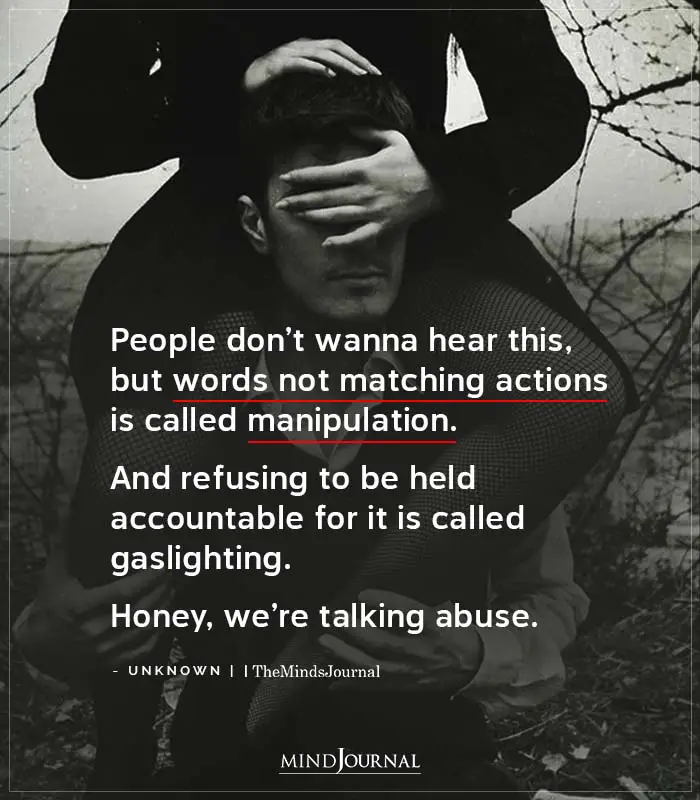
All three types (narcissism to a lesser degree) scored low on agreeableness, measured by the Big Five personality test that assesses extraversion, neuroticism, agreeableness, conscientiousness, and openness. Agreeableness differs from charm and charisma. It involves trustworthiness, unselfishness, straightforwardness, compliance, kindness, and modesty, which are essential for good relationships.
Machiavellians and psychopaths are more lacking in conscientiousness. (Why work when you can cheat and steal!) Psychopaths have the lowest level of neuroticism or negative emotions, which makes them the most sinister. Predictably, narcissists scored higher on openness and are much more extroverted. Openness correlates with evidence that narcissists tend to be creative.
1. Deception
All three personalities lack honesty and humility, which includes sincerity, faithfulness, lack of greed, and fairness. A study of cheating revealed that all three cheat when the risk of getting caught is low.
When the risk is high, psychopaths and Machiavellians (when their energy for thinking is low) cheat. Both will intentionally lie. Narcissists have high levels of self-deception rather than intentional dishonesty.
2. Psychosocial consequences
The comparative research examined a variety of behaviors, including aggression (bullying, sadism, aggression, and violence), erratic lifestyle (impulsivity, risk-taking, and substance use), sexual activity (bizarre fantasies, infidelity, and sexual harassment), socio-emotional deficits (lack of empathy, low emotional intelligence, and theory of mind, i.e., to attribute own and others’ mental states), poor well-being (depression, loneliness,, and stress), interpersonal problems (dominance, entitlement, and self-aggrandizement), immorality (lack of values, “deadly sins,” and moral disengagement, i.e. “standards don’t apply to me”), and antisocial tactics (cheating, lying, and negative humour).
Machiavellians and psychopaths scored higher in these psychosocial issues; psychopaths twice as high as narcissists. The highest scores were among psychopaths, with aggression being the highest trait. Narcissists scored in the categories of aggression, sexual issues, interpersonal difficulties, and antisocial tactics. Among all three personalities, most of the high scores were due to psychopathic traits. When those were controlled (removed), narcissism still accounted for interpersonal difficulties.
Read : 9 Ways to Identify that Sociopath, Psychopath, or Narcissist in your life
3. Callousness
To further understand the lack of empathy among the Dark Triad personalities, research examined affective empathy, which is the ability to have an appropriate emotional response to others’ emotions, and cognitive empathy, the ability to discern others’ emotional states. They found that all three personality types lacked affective empathy, but had unimpaired cognitive empathy.
Creepily, all three felt positive looking sad faces and felt negative seeing happy images! Narcissists and psychopaths also felt good seeing angry faces. Psychopaths liked seeing fearful faces. Overall empathy was lowest among psychopaths and Machiavellians, and study participants who were high on any of the three personality profiles had the lowest affective empathy. Narcissists scored highest on cognitive empathy. The fact that these people are insensitive to others feelings while retaining the ability to assess others’ emotions, allows them to strategically manipulate people while ignoring the harm they inflict.
To find out whether you or someone you know may qualify, take the Dark Triad test.
Read : 10 Warning Signs That You’re Dealing With a Sociopath, Narcissist, or Psychopath
Protect Yourself
If you think you may be involved with a Dark Triad personality, seek psychotherapy. Don’t be afraid to talk to others about your experience. Covering up bad behavior is a common, but dangerous form of denial. Learn about narcissistic abuse, subtle forms of abuse, abusive relationships, and narcissistic relationships. Learn How to Be Assertive and read Dealing with a Narcissist. Violence is preceded by emotional abuse. If you’ve been threatened with violence, don’t wait for it to happen or trust that it won’t be repeated!
© Darlene Lancer 2018
Written by Darlene Lancer JD, MFT
Originally appeared on WhatIsCodependency.com
Republished with permission.
